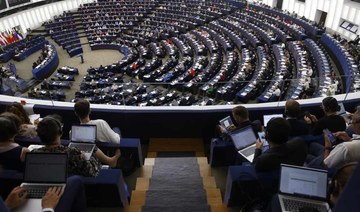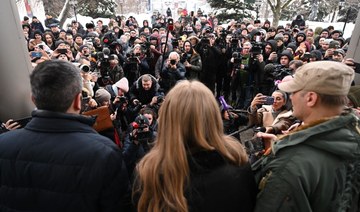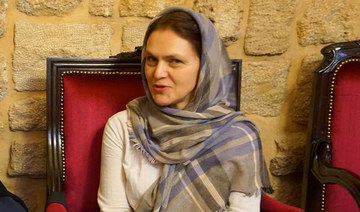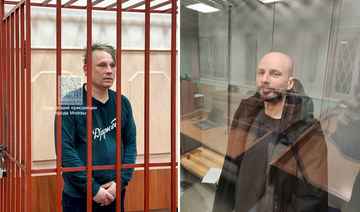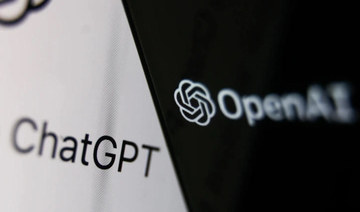RIO DE JANEIRO: A US congressional committee released confidential Brazilian court orders to suspend accounts on the social media platform X, offering a glimpse into decisions that have spurred complaints of alleged censorship from the company and its billionaire owner Elon Musk.
The Republican-controlled House Judiciary Committee late Wednesday published a staff report disclosing dozens of decisions by Brazilian Supreme Court Justice Alexandre de Moraes ordering X to suspend or remove around 150 user profiles from its platform in recent years.
The 541-page report is the product of committee subpoenas directed at X. In his orders, de Moraes had prohibited X from making them public.
“To comply with its obligations under US law, X Corp. has responded to the Committee,” the company said in a statement on X on April 15.
The disclosure comes amid a battle Musk has waged against de Moraes.
Musk, a self-proclaimed free-speech absolutist, had vowed to publish de Moraes’ orders, which he equated to censorship. His crusade has been cheered on by supporters of far-right former President Jair Bolsonaro, who allege they are being targeted by political persecution, and have found common cause with their ideological allies in the US
De Moraes has overseen a five-year probe of so-called “digital militias,” who allegedly spread defamatory fake news and threats to Supreme Court justices. The investigation expanded to include those inciting demonstrations across the country, seeking to overturn Bolsonaro’s 2022 election loss. Those protests culminated in the Jan. 8 uprising in Brazil’s capital, with Bolsonaro supporters storming government buildings, including the Supreme Court, in an attempt to oust President Luiz Inácio Lula da Silva from office.
De Moraes’ critics claim he has abused his powers and shouldn’t be allowed to unilaterally ban social media accounts, including those of democratically elected legislators. But most legal experts see his brash tactics as legally sound and furthermore justified by extraordinary circumstances of democracy imperiled. They note his decisions have been either upheld by his fellow justices or gone unchallenged.
The secret orders disclosed by the congressional committee had been issued both by Brazil’s Supreme Court and its top electoral court, over which de Moraes currently presides.
The press office of the Supreme Court declined to comment on the potential ramifications of their release when contacted by The Associated Press.
“Musk is indeed a very innovative businessman; he innovated with electric cars, he innovated with rockets and now he invented a new form of non-compliance of a court order, through an intermediary,” said Carlos Affonso, director of the nonprofit Institute of Technology and Society. “He said he would reveal the documents and he found someone to do this for him.”
Affonso, also a professor of civil rights at the State University of Rio de Janeiro, said that the orders are legal but do merit debate, given users were not informed why their accounts were suspended and whether the action was taken by the platform or at the behest of a court. The orders to X included in the report rarely provide justification, either.
The Supreme Court’s press office said in a statement Thursday afternoon that the orders do not contain justifications, but said the company and people with suspended accounts can gain access by requesting the decisions from the court.
While Musk has repeatedly decried de Moraes’ orders as suppressing “free speech” principles and amounting to “aggressive censorship,” the company under his ownership has bowed to government requests from around the world.
Last year, for instance, X blocked posts critical of Turkish President Recep Tayyip Erdogan and, in February, it blocked accounts and posts in India at the behest of the country’s government.
“The Indian government has issued executive orders requiring X to act on specific accounts and posts, subject to potential penalties including significant fines and imprisonment,” X’s global affairs account posted on Feb. 21. “In compliance with the orders, we will withhold these accounts and posts in India alone; however, we disagree with these actions and maintain that freedom of expression should extend to these posts.”
Brazil is a key market for X and other social media platforms. About 40 million Brazilians, or about 18 percent of the population, access X at least once per month, according to market research group eMarketer.
X has followed suspension orders under threat of hefty fines. De Moraes typically required compliance within two hours, and established a daily fine of 100,000-reais ($20,000) for noncompliance.
It isn’t clear whether the 150 suspended accounts represent the entirety of those de Moraes ordered suspended. Until the committee report, it wasn’t known whether the total was a handful, a few dozen or more. Some of the suspended accounts in the report have since been reactivated.
On April 6, Musk took to X to challenge de Moraes, questioning why he was “demanding so much censorship in Brazil”. The following day, the tech mogul said he would cease to comply with court orders to block accounts — and that de Moraes should either resign or be impeached. Predicting that X could be shut down in Brazil, he instructed Brazilians to use a VPN to retain their access.
De Moraes swiftly included Musk in the ongoing investigation of digital militias, and launched a separate investigation into whether Musk engaged in obstruction, criminal organization and incitement. On April 13, X’s legal representative in Brazil wrote to de Moraes that it will comply with all court orders, according to the letter, seen by the AP.
Affonso said the committee’s release of de Moraes’ orders were aimed less at Brazil than at the administration of US President Joe Biden. The report cites Brazil “as a stark warning to Americans about the threats posed by government censorship here at home.”
Terms like “censorship” and “free speech” have turned into political rallying cries for US conservatives since at least the 2016 presidential election, frustrated at seeing right-leaning commentators and high-profile Republican officials booted off Facebook and Twitter in its pre-Musk version for violating rules.
“The reason why the far-right needs him (Musk) is because they need a platform, they need a place to promote themselves. And Elon Musk needs far-right politicians because they will keep his platform protected from regulations,” said David Nemer, a Brazil native and University of Virginia professor who studies social media.
In the US, free speech is a constitutional right that’s much more permissive than in other countries, including Brazil. Still, the report’s release seemed to invigorate Bolsonaro and his far-right supporters.
Late Wednesday, soon after the court orders were released, Bolsonaro capped off a speech at a public event by calling for a round of applause for Musk.
His audience eagerly complied.
US congressional committee releases sealed Brazil court orders to Musk’s X, shedding light on account suspensions
https://arab.news/jx5ne
US congressional committee releases sealed Brazil court orders to Musk’s X, shedding light on account suspensions
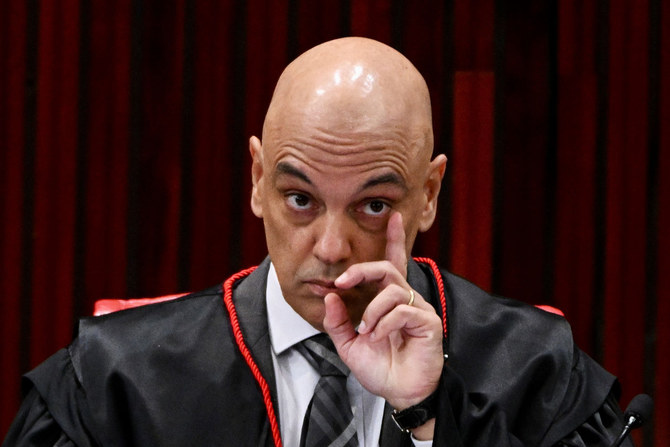
EU bans 4 more Russian media outlets from broadcasting in the bloc, citing disinformation

- The EU has already suspended Russia Today and Sputnik among several other outlets since February 2022
BRUSSELS: The European Union on Friday banned four more Russian media outlets from broadcasting in the 27-nation bloc for what it calls the spread of propaganda about the invasion of Ukraine and disinformation as the EU heads into parliamentary elections in three weeks.
The latest batch of broadcasters consists of Voice of Europe, RIA Novosti, Izvestia and Rossiyskaya Gazeta, which the EU claims are all under control of the Kremlin. It said in a statement that the four are in particular targeting “European political parties, especially during election periods.”
Belgium already last month opened an investigation into suspected Russian interference in June’s Europe-wide elections, saying its country’s intelligence service has confirmed the existence of a network trying to undermine support for Ukraine.
The Czech government has imposed sanctions on a number of people after a pro-Russian influence operation was uncovered there. They are alleged to have approached members of the European Parliament and offered them money to promote Russian propaganda.
Since the war started in February 2022, the EU has already suspended Russia Today and Sputnik among several other outlets.
Israeli soldiers post abusive videos despite army’s pledge to act: BBC analysis

- The BBC analyzed 45 photos and videos posted online by Israeli soldiers that showed Palestinian prisoners in the West Bank being abused and humiliated
LONDON: Israeli soldiers continue to post videos of abuse against Palestinian detainees despite a military pledge to take action against the perpetrators, analysis by the BBC has found.
The broadcaster said it had analyzed 45 photos and videos posted online by Israeli soldiers that showed Palestinian prisoners in the West Bank being abused and humiliated. Some were draped in Israeli flags.
Experts say the footage and images, which showed Palestinians being stripped, beaten and blindfolded, could breach international law and amount to a war crime.
The Israel Defense Forces said some soldiers had been disciplined or suspended for “unacceptable behavior” but did not comment on the individual cases identified by the BBC.
The most recent investigation into social media misconduct by Israeli soldiers follows a previous inquiry in which BBC Verify confirmed Israeli soldiers had filmed Gazan detainees while beating them and then posted the material on social platforms.
The Israeli military has carried out arbitrary arrests across Gaza and the West Bank, including East Jerusalem, since the Hamas attack on Oct. 7. The number of Palestinian prisoners in the West Bank has since risen to more than 7,060 according to the Commission of Detainees’ Affairs and the Palestinian Prisoner Society.
Ori Givati, spokesperson for Breaking the Silence, a non-governmental organization for Israeli veterans working to expose wrongdoing in the IDF, told the BBC he was “far from shocked” to hear the misconduct was ongoing.
Blaming “current far-right political rhetoric in the country” for further encouraging the abuse, he added: “There are no repercussions. They [Israeli soldiers] get encouraged and supported by the highest ministers of the government.”
He said this played into a mindset already subscribed to by the military: “The culture in the military, when it comes to Palestinians, is that they are only targets. They are not human beings. This is how the military teaches you to behave.”
The BBC’s analysis found that the videos and photos it examined were posted by 11 soldiers of the Kfir Brigade, the largest infantry brigade in the IDF. None of them hid their identity.
The IDF did not respond when the BBC asked about the actions of the individual soldiers and whether they had been disciplined.
The BBC also attempted to contact the soldiers on social media. The organization was blocked by one, while none of the others responded.
Mark Ellis, executive director of the International Bar Association, urged an investigation into the incidents shown in the footage and called for the IDF to discipline those involved.
In response to the BBC’s investigation, the IDF said: “The IDF holds its soldiers to a professional standard … and investigates when behavior is not in line with the IDF’s values. In the event of unacceptable behavior, soldiers were disciplined and even suspended from reserve duty.
“Additionally, soldiers are instructed to avoid uploading footage of operational activities to social media networks.”
However, it did not acknowledge its pledge to act on BBC Verify’s earlier findings in Gaza, according to the broadcaster.
4 journalists killed in Gaza as death toll climbs above 100

- 104 Palestinian media workers reported dead, along with 3 Lebanese and 2 Israelis
LONDON: The Gaza Media Authority on Thursday said that four journalists had been killed in an Israeli airstrike, bringing the total number of journalists killed in the conflict to more than 100.
The victims were identified as Hail Al-Najjar, a video editor at the Al-Aqsa Media Network; Mahmoud Jahjouh, a photojournalist at the Palestine Post website; Moath Mustafa Al-Ghefari, a photojournalist at the Kanaan Land website and Palestinian Media Foundation; and Amina Mahmoud Hameed, a program presenter and editor at several media outlets, according to the Anadolu Agency.
The Gaza Media Office said the four were killed in an Israeli airstrike, but did not provide additional details on the circumstances surrounding their deaths.
A total of 104 Palestinian journalists have been killed since the conflict began on Oct. 7. Two Israeli and three Lebanese media workers also have been killed.
The latest loss adds to the already heavy toll on media workers, with the Committee to Protect Journalists saying the Gaza conflict is the deadliest for journalists and media workers since it began keeping records.
Israel is continuing its offensive on Gaza despite a UN Security Council resolution demanding an immediate ceasefire.
On Thursday, South Africa, which has brought a case accusing Israel of genocide to the International Court of Justice, urged the court to order Israel to halt its assault on Rafah.
According to Gaza medical authorities, more than 35,200 Palestinians have been killed, mostly women and children, and over 79,200 have been injured since early October when Israel launched its offensive following an attack by Hamas.
Russia outlaws SOTA opposition news outlet

- Authorities said outlet tries to destabilize the socio-political situation in Russia
- Move could criminalize SOTA content and puts its reporters at risk of arrest
LONDON: Russia declared opposition media outlet SOTA “undesirable” on Thursday, a move that could criminalize the sharing of its content and put its reporters at risk of arrest.
Authorities in Russia have declared dozens of news outlets, think tanks and non-profit organizations “undesirable” since 2015, a label rights groups say is designed to deter dissent.
In a statement, Russia’s Prosecutor General accused SOTA of “frank attempts to destabilize the socio-political situation in Russia” and “create tension and irritation in society.”
“Such activities, obviously encouraged by so-called Western inspirers, have the goal of undermining the spiritual and moral foundations of Russian society,” it said.
It also accused SOTA of co-operating with TV Rain and The Insider, two other independent Russian-language outlets based outside of the country that are linked to the opposition.
SOTA Project, which covers opposition protests and has been fiercely critical of the Kremlin, denied it had anything to do with TV Rain and The Insider and rejected the claims.
But it advised its followers in Russia to “remove reposts and links” to its materials to avoid the risk of prosecution. SOTA’s Telegram channel has around 137,000 subscribers.
“Law enforcement and courts consider publishing online to be a continuing offense. This means that you can be prosecuted for reposts from 2023, 2022, 2021,” it said.
SOTA Project was born out of a split with a separate news outlet called SOTAvision, which still covers the opposition but distanced itself from the prosecutors’ ruling on Thursday.
Since launching its offensive in Ukraine, Moscow has waged an unprecedented crackdown on dissent that rights groups have likened to Soviet-era mass repression.
Among other organizations labelled as “undesirable” in Russia are the World Wildlife Fund, Greenpeace, Transparency International and Radio Free Europe/Radio Liberty.
OpenAI strikes deal to bring Reddit content to ChatGPT

- Deal underscores Reddit’s attempt to diversify beyond its advertising business
- Content will be used to train AI models
LONDON: Reddit has partnered with OpenAI to bring its content to popular chatbot ChatGPT, the companies said on Thursday, sending the social media platform’s shares up 12 percent in extended trade.
The deal underscores Reddit’s attempt to diversify beyond its advertising business, and follows its recent partnership with Alphabet to make its content available for training Google’s AI models.
ChatGPT and other OpenAI products will use Reddit’s application programming interface, the means by which Reddit distributes its content, following the new partnership.
OpenAI will also become a Reddit advertising partner, the company said.
Ahead of Reddit’s March IPO, Reuters reported that Reddit struck its deal with Alphabet, worth about $60 million per year.
Investors view selling its data to train AI models as a key source of revenue beyond Reddit’s advertising business.
The social media company earlier this month reported strong revenue growth and improving profitability in the first earnings since its market debut, indicating that its Google deal and its push to grow its ads business were paying off.
Reddit’s shares rose 10.5 percent to $62.31 after the bell. As of Wednesday’s close, the stock is up nearly 12 percent since its market debut in March.





